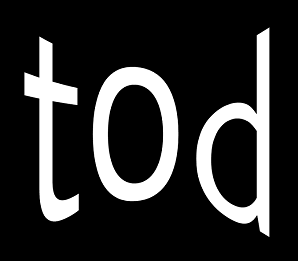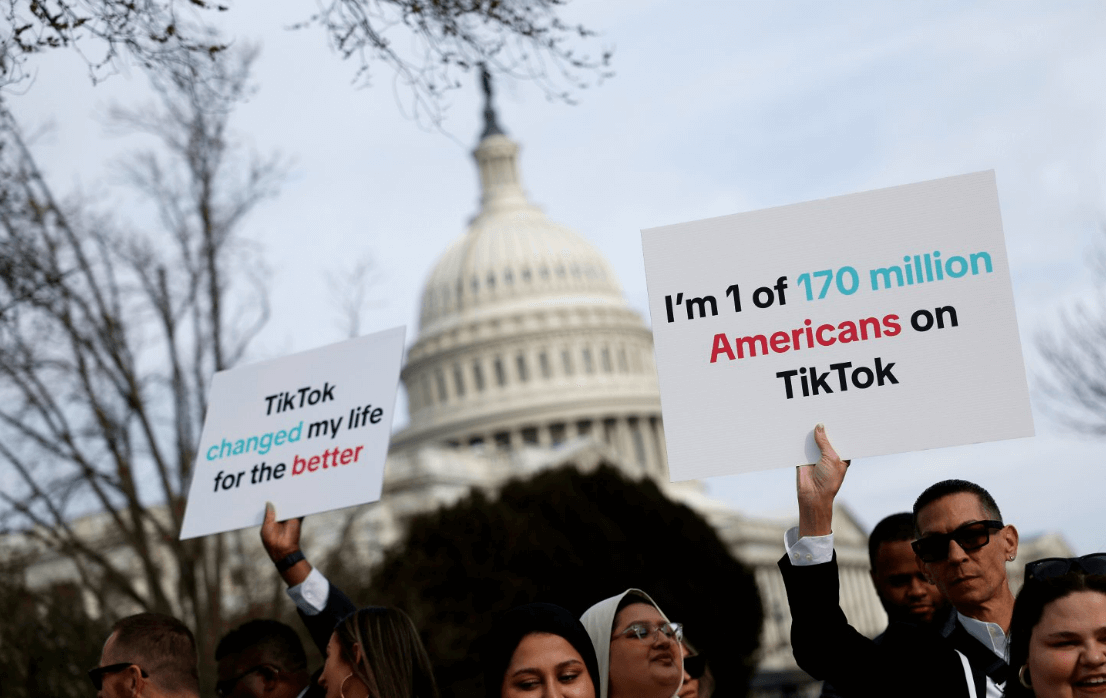Click to Read Sections:
- 1 Everything You Need to Know About the TikTok Ban
- 2 Who Could Buy TikTok?
- 3 Political Pandering and Policy Reversals
- 4 Who Really Owns TikTok?
- 5 How Much Control of and Access to TikTok Does the Chinese Government Have?
- 6 How Popular is TikTok in America?
- 7 Who Uses TikTok?
- 8 Will TikTok Really Get Banned?
Everything You Need to Know About the TikTok Ban
President Biden signed a TikTok ban that was attached to a $95 billion aid deal providing support to Ukraine and Israel. The bill gives the Chinese company ByteDance nine months to sell TikTok to an American company or it will be banned in the US. Officials fear the Chinese government will access the data of American users and use the app to spread propaganda or influence foreign elections. Members of Congress have referred to information they learned in top secret security briefings about the potential for TikTok to harm American interests, but the contents of those briefings are not public. The bill signed April 24 extended the previous deadline by three months, and gave the president authority to extend that by another 90 days, so ByteDance now has up to a year to find a US buyer.
Who Could Buy TikTok?
The Usual Suspects Would Face Anti-Trust Concerns
Microsoft, Google, Amazon, and Meta are the usual suspects with the money to buy the platform and the proprietary algorithm that serves the video stream to users, but they would likely be blocked by anti-trust lawsuits from the FTC.
Other Existing Companies May Face Chinese Government Pushback
Other existing companies with the means to purchase TikTok like AT&T, Verizon, Oracle, and maybe Walmart might find the sale of the algorithm blocked by the Chinese government. In August 2020, China updated its export rules to restrict the export of algorithms like those used by TikTok for content recommendation as a way to give it a say in TikTok’s future.
New Investor Groups Couldn’t Afford the Prized Algorithm
New investor groups have also expressed interest in buying TikTok, although without the algorithm due to the cost and the control of the Chinese government. In this scenario only the brand and the user base would be purchased and not TikTok’s coveted algorithm that is the foundation of the app’s popularity. One investor group is led by Shark Tank’s Kevin O’Leary who says that without the algorithm TikTok could be worth $20-30 billion. The value of TikTok with the algorithm is estimated at $100 billion.
Another investor group is led by former Trump Treasury Secretary Steven Mnuchin. Mnuchin led the Trump administration’s effort to ban TikTok several years ago, and gained insider and top secret information during that process. His plan to rebuild TikTok without the algorithm has been met with skepticism, noting that Facebook, Instagram, and YouTube have invested considerable resources over many years to replicate TikTok’s success, and such an endeavor couldn’t be accomplished quickly following the purchase of TikTok’s brand.
Any Owner of a Social Network Will Face Lawsuits Over Its Algorithm

Whatever the disposition, fierce opposition to addictive algorithms will face TikTok and other social networks. Social networks like Facebook, Twitter, and YouTube have faced numerous lawsuits related to their algorithms, primarily focusing on issues such as data privacy violations, the spread of misinformation, and enabling discriminatory practices. Lawsuits against social networks have also targeted the addictive nature of their algorithms. These legal challenges argue that platforms design their algorithms intentionally to foster addiction, maximizing user engagement to increase ad revenue. Plaintiffs claim that such designs can lead to detrimental psychological effects, including anxiety, depression, and lower self-esteem, particularly among younger users.
Political Pandering and Policy Reversals
Trump Uses the TikTok Ban to Gaslight America and Contradict Himself
In an executive order issued on August 6, 2020, Trump described TikTok as a significant national security threat, alleging that the app could allow the Chinese Communist Party (CCP) access to Americans’ personal and proprietary information. He suggested this data could potentially enable China to track the locations of Federal employees, construct dossiers for blackmail, and conduct corporate espionage. Despite previously attempting to restrict the app under his own administration, he posted to Truth Social on April 22:
“Just so everyone knows, especially the young people, Crooked Joe Biden is responsible for banning TikTok.”
Donald Trump
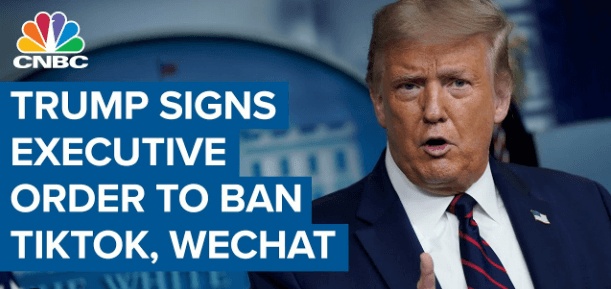
Donald Trump’s executive order to ban TikTok faced significant legal and operational challenges, leading to its eventual non-implementation. After the order was issued in August 2020, which directed a ban on any transactions with TikTok’s parent company ByteDance, several lawsuits were filed against the order. TikTok argued that the ban was unconstitutional and infringed on the right to free speech and due process.
What Happened When Trump Tried to Ban TikTok?
In response to these legal challenges, U.S. courts issued temporary injunctions that prevented the ban from taking immediate effect. These rulings cited issues with the order’s impact on First Amendment rights and questioned the administration’s authority under the International Emergency Economic Powers Act (IEEPA) to enforce such a sweeping ban.
Biden Revoked Trump’s TikTok Ban in 2021
Ultimately, when President Joe Biden took office in January 2021, his administration paused the enforcement of Trump’s orders related to TikTok and WeChat to review the underlying security concerns. In June 2021, President Biden revoked the Trump-era bans with a new executive order. This new order called for a broader review of various foreign-controlled applications and their impact on national security, effectively shifting the approach from outright bans to a more structured investigation of potential security risks associated with foreign-owned apps.
Biden is Still Using TikTok for His Re-election Campaign
Despite signing the bill that forces the sale of TikTok, Biden uses the platform for his re-election campaign. Biden’s campaign launched its TikTok account during the Super Bowl and has since been using the platform to reach an audience that is typically harder to engage through traditional media channels. For security the campaign uses a separate device for TikTok. The Biden campaign has been posting videos that mix humor with political messages, aiming to engage users in a more relaxed and relatable manner.
On the campaign trail Vice President Kamala Harris told a Gen Z crowd:
‘We’re not trying to ban TikTok, we’re basically saying we gotta pay attention to who the owner of TikTok is and pay attention to what that presents in terms of national security issues,’ she said. ‘We do not want to ban TikTok at all.’
VP Kamala Harris
Who Really Owns TikTok?
ByteDance, the parent company of TikTok, is primarily owned by a mix of global institutional investors, the company’s founder, and its employees. Specifically, about 60% of ByteDance is owned by global institutional investors, including Blackrock, General Atlantic, and Susquehanna International Group. Around 20% is owned by the company’s founder, and the remaining 20% is owned by employees of ByteDance, which includes over 7,000 Americans.
How Much Control of and Access to TikTok Does the Chinese Government Have?
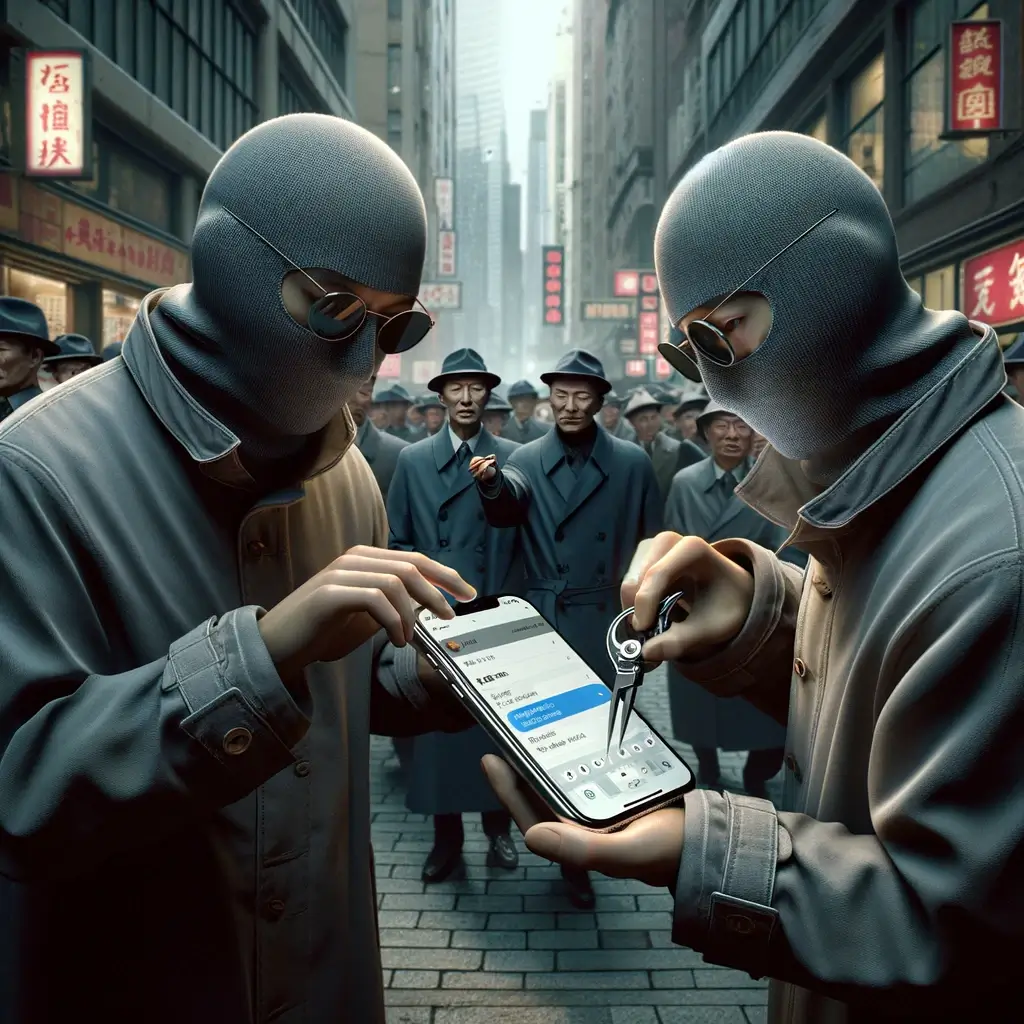
The extent of control and access that the Chinese government has over TikTok is a topic of significant debate and concern. Laws over data access and golden shares are what prompts fears about Chinese government getting control of Americans’ information, even as ByteDance has tried to minimize that possibility with it’s international operations.
Chinese Law and Data Access
Chinese national security laws, such as the National Intelligence Law of 2017 and the Cybersecurity Law, mandate that all organizations and citizens must “support, assist, and cooperate with state intelligence work.” This has led to concerns that ByteDance could be compelled to hand over TikTok user data to the Chinese government if requested. However, TikTok has consistently denied that it would comply with such a request and states that its data centers for international users are located outside China, specifically in the U.S. and Singapore.
The concept of “golden shares” held by the Chinese government in ByteDance’s Chinese operations, specifically in subsidiaries like Beijing Douyin Information Service, has raised suspicions. (While the specifics are unclear, Beijing Douyin Information Service appears to be a part of ByteDance that contributes to the operations of Douyin, and likely TikTok as well. Douyin and TikTok are essentially the same platform, but Douyin is used in China and subject to Chinese censorship.)
While these shares grant the government a potential strategic oversight role, they reportedly do not extend to control over ByteDance’s global operations or TikTok. However, the presence of these shares indicates a level of governmental interest and potential influence in company operations, though its direct impact on TikTok’s international business is not transparently clear
ByteDance’s Internal Structure Minimizes Government Interference
Although ByteDance is still a Chinese company by origin, it has taken steps to isolate user data from foreign access such as storing U.S. data locally through “Project Texas” and restructuring its business to place its U.S. operations under a U.S.-based subsidiary. These measures are intended to address concerns about Chinese governmental interference.
How Popular is TikTok in America?
Overall, TikTok’s user base in the United States is diverse and highly engaged, with a significant skew towards younger audiences who are more likely to both consume and create content.
Do Americans Want TikTok Banned?
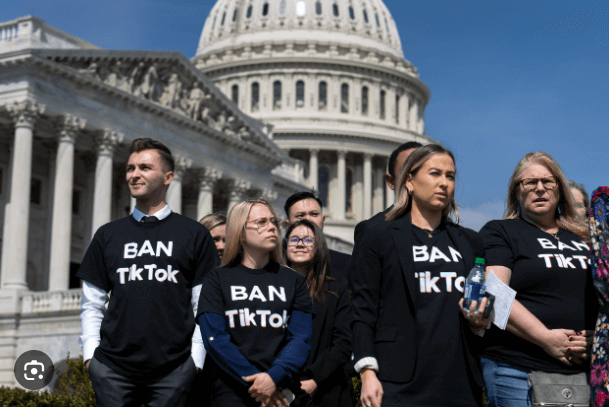
A year ago 50% of Americans polled by Pew Research said Congress should get rid of the app. But last December more people opposed the ban with 38% of Americans supporting banning TikTok compared to 27% who oppose and 35% who are unsure about the idea. The survey also found those more support for TikTok among U.S. adults under age 30. Among younger Americans, 41% oppose a ban versus 29% who support and 30% who remain unsure.
Who Uses TikTok?
User Base and Subscribers:
TikTok has been downloaded over 200 million times in the United States alone. The app has a substantial active user base, with estimates suggesting around 100 million monthly active users in the U.S.
Demographics:
TikTok is especially popular among younger audiences. About 47% of TikTok’s active users in the U.S. are between the ages of 10 and 29. However, its use among older age groups has been increasing. The platform tends to have a slightly higher female user base than male.
Content Creation vs. Consumption:
A large portion of TikTok’s appeal lies in its content consumption, with a vast majority of users primarily engaging as viewers. It is estimated that around 83% of TikTok users have posted a video at least once, but regular content creation is typically less common. The platform is designed to encourage interaction through easy-to-use video creation tools, leading to a higher likelihood of users trying out content creation compared to other platforms.
Engagement:
TikTok users are highly engaged, with average daily usage times often exceeding 45 minutes. The app’s algorithm, which curates a personalized “For You” page, plays a significant role in maintaining high engagement levels by continuously delivering content tailored to the user’s preferences and interaction history.
Will TikTok Really Get Banned?
Now that Congress has approved the legislation, expect TikTok to fight it in court. That has worked in the past – former President Donald Trump also attempted to ban TikTok, which was blocked by a federal judge. More recently, a federal judge in Montana blocked a state ban, saying it “likely violates the First Amendment.”
Even if an American company could purchase the app, the Chinese government would likely block the sale of TikTok’s algorithm, which would require rebuilding the foundation of the app’s popularity. Without the algorithm, the app’s future might be doomed, leaving it in the junk drawer of discarded social networks like MySpace, Friendster, Google+, Vine, and Hi5.
